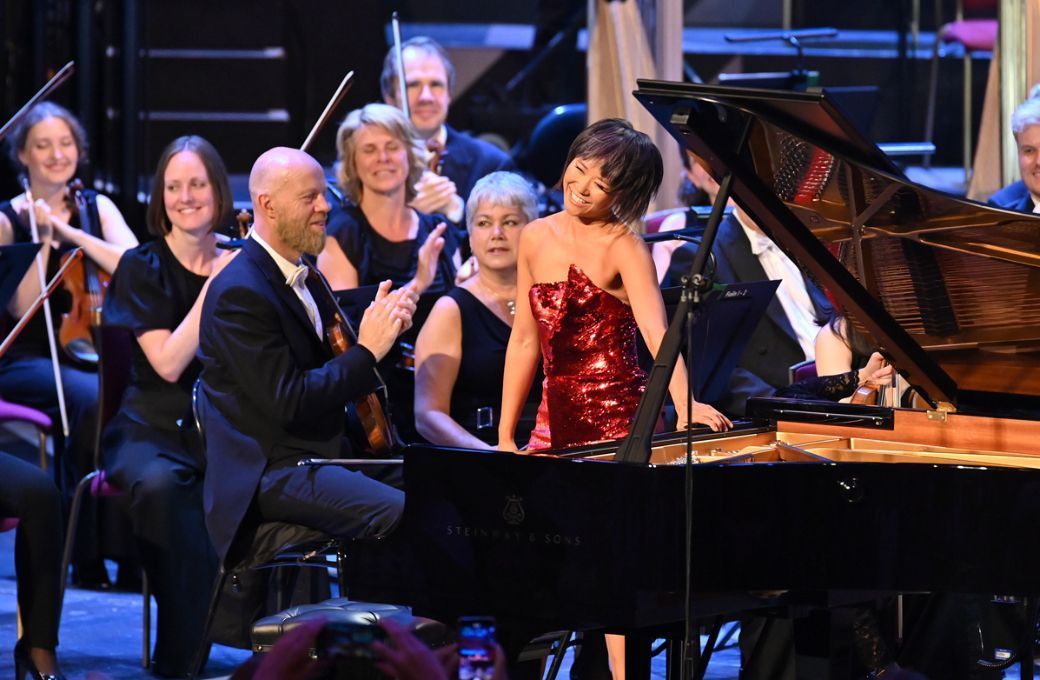Taking their places on stage for Prom 35 and seeing a Royal Albert Hall filled to the rafters must surely have made every heart skip in the musicians of the Oslo Philharmonic – it was emotional enough for those of us in the audience. Still, playing a concert with a global superstar must be a mixed blessing; the suspicion must have been in the back of their minds that the real crowd-puller on this occasion was Yuja Wang.
And you couldn’t fault the logic of anyone who had come specially to see Wang. Leave aside the minimalist dress and the maximalist heels – this was pianism of the very finest. Wang does things that other pianists can’t. She can traverse the keyboard from end to end with a ripple of notes, shaping the dynamics and adding rubato, with the perfect evenness unbroken. She can produce a pianissimo down to a whisper, so perfectly articulated that you can hear every nuance even in the giant space of the Albert Hall. I could continue. Her performance was packed with “how does she do that?” moments. For someone with such a small frame, Wang was surprisingly muscular in the brasher passages of Liszt’s Piano Concerto no.1 in E flat major, to great effect, but she could also change to quicksilver agility. And for anyone put off by the rock star demeanour, she also produced heart-melting intimacy in passages played with solo clarinet or a pair of violins.
The encores were worth the visit on their own; if you’re going to thrill the audience with Vladimir Horowitz's high octane variations on the “Chanson bohème” from Carmen, clearly, the thing to do is to play the final repeat at what felt like twice the speed, looking quite the picture of nonchalant relaxation all the while. A reflective melody from Gluck's Orfeo ed Euridice provided a complete contrast to close a thoroughly satisfying performance.

Perhaps wisely, Klaus Mäkelä kept the Oslo Philharmonic in a largely supporting role for the concerto, with plenty of individual instrumental quality, but overall orchestral levels low enough to let their star soloist shine. Our introduction to Mäkelä at work came in the concert’s opener, Tapiola, by fellow Finn Sibelius. Mäkelä's style is unusual; like Wang, he looks totally relaxed for much of the time, pointing at a particular musician here and there for some desired shift in dynamics or phrasing. But when the occasion demands, he keeps time with both arms sculpting the music. When he wants precision in an animated passage, those movements can become exceptionally fast and precise. If he ever takes up tennis, he will achieve phenomenal racket speed. The resulting music conformed very much to one’s Nordic stereotypes: cool, crystalline clarity with a string sound of immaculate tightness, but clear-headed rather than passionate. You heard every note.
There was, however, passion aplenty in Richard Strauss’ Ein Heldenleben. In the Hero’s Companion movement, concertmaster Elise Båtnes and principal horn Inger Besserudhagen produced a love duet that was nothing short of sublime, with the dialogue between solo violin and orchestra lovely throughout the movement. The tuba duo of Frode Amundsen and Hans Andreas Kjølberg earned the biggest cheers of the night. The call to arms from off-stage trumpets in The Hero’s Battlefield was rather lost in the cavernous hall, but the battle itself had vigour and fire. The brass, splendid throughout, provided a lovely chorale to end the formal proceedings. What impressed through the whole work was the range of orchestral colours in a true ensemble performance.
For the encore, a surprise in the shape of the csárdás from Johann Strauss II's Ritter Pázmán. It’s a long way north from Vienna to Oslo and no-one would describe this orchestra as having a quintessentially Viennese sound, but hats off to them for daring to try it. And there was no doubting the infectious fun being had by all.


